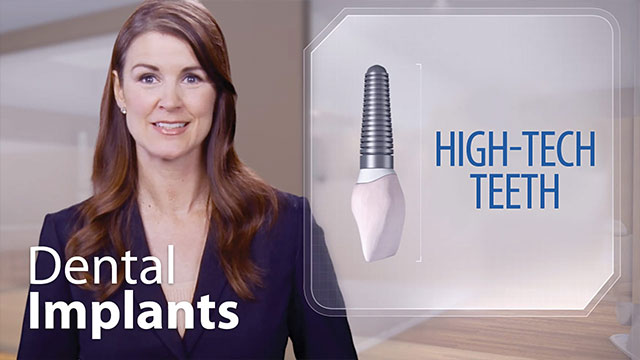
A dental implant is an artificial tooth root used to support a replacement tooth or prosthesis, such as a denture. Modern dental implants are composed of surgical-grade titanium and are much more biocompatible than implant materials used in the past. While successful implants depend on surgical technique, materials, and type of restoration used over the implant, success also depends heavily on patient implant care and overall health.
What dental implants can do:
- Replace one or more teeth without affecting neighboring teeth.
- Support a bridge and eliminate the need for a removable partial denture.
- Provide needed stability and support for dentures
- Provide anchorage for orthodontic treatment
- Restoring confidence and functionality
Today’s dental implants are so natural-looking and feeling, you may forget you ever lost a tooth. There are many situations where implants can help change your life. If you’re missing teeth and would like to smile, speak and eat again with comfort and confidence, you’ve found the right place! Dental implants are teeth that can look and feel just like your own. Under proper conditions, such as placement by a periodontist and diligent patient maintenance, implants can last a lifetime. Long-term studies continue to show improving success rates for implants.
Advantages Of Dental Implants Over A Bridge Or Non-Implant Supported Denture
Esthetic
Today’s dental implants are so natural-looking and feeling, you may forget you ever lost a tooth. There are many situations where implants can help change your life. If you’re missing teeth and would like to smile, speak and eat again with comfort and confidence, you’ve found the right place! Dental implants are teeth that can look and feel just like your own. Under proper conditions, such as placement by a periodontist and diligent patient maintenance, implants can last a lifetime. Long-term studies continue to show improving success rates for implants.
Tooth-saving
If the teeth adjacent to your missing tooth do not need crowns, you would be jeopardizing their integrity by placing a bridge. With implants, more of your own teeth are left untouched, and the risks and disadvantages of bridge failure can be avoided.
Confidence
Dental implants will allow you to once again speak and eat with comfort and confidence! Dentures that dislodge when eating or speaking can be embarrassing. With the added benefit of not needing messy pastes or losing dentures, implants are sure to make you a happier, more confident you.
Reliable
Risk factors such as diabetes, smoking and poor oral hygiene can negatively affect implant retention success. However, the success rate of dental implants can be very predictable with proper maintenance, oral hygiene, and systemic health.
Basic Procedure
Placing dental implants is done by using precision drills that have highly regulated torque and speed. After implant placement, there is a natural healing time required for the implant to integrate securely into the bone; this process is called osseointegration. Once osseointegrated, a tooth or teeth replacement can be placed on the implant.
Healing Time
The amount of time required to heal will vary depending on the quality and quantity of the bone and the difficulty of the individual situation. In general implants are allowed to heal for 2–6 months before they are used to support crowns, bridges, or dentures. However, if the implant is loaded too soon, it is possible that the implant may move which results in failure. Therefore it is important for patients to follow post operative instructions closely to maximize implant success.
What Can I Expect After The Procedure?
As you know, your own teeth require conscientious at-home oral care and regular dental visits. Dental implants are like your own teeth and will require the same care. In order to keep your implant clean and plaque-free, brushing and flossing still apply! After treatment, Dr. Kapoor will work closely with you and your dentist to develop the best care plan for you. Regular follow-up visits are scheduled to monitor your implant, teeth and gums to make sure they are healthy.
Will The Procedure Hurt?
Dr. Kapoor and Kapoor have trained extensively in dental implant surgery and are licensed to perform conscious sedation. Using conscious sedation, you will be able to control breathing on your own, but you will be unaware of any procedures going on during the time of surgery. Our patients frequently say things such as, “I remember being sedated and the next thing I remembered was waking up and my teeth were fixed!” Sedation is not required for surgery. Local anesthetics are always used to numb the area being worked on; however, sedation is a great option for patients with anxiety, or those simply wishing to have the procedure done as comfortably as possible.
Dental implants are changing the way people live! With them, people are rediscovering the comfort and confidence to eat, speak, laugh, and enjoy life.
Dr. Kapoor and Kapoor have received extensive training in implant surgery. He has been successfully placing implants since 1997. Through continuing education, Dr. Kapoor is abreast of the most current information on implant dentistry. Dr. Kapoor provides dental implants serving the greater Dallas/Fort Worth metroplex. For any questions regarding implants and if they’re right for you, please stop by or call our Dallas, Keller, or Irving office.
